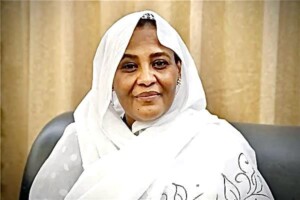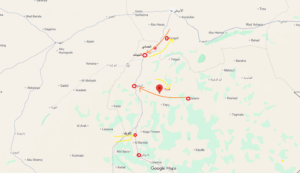Troika, EU ‘will not support unilaterally appointed Sudan govt’
In a joint media note on Tuesday, the Sudan Troika (Norway, UK and USA) and the European Union reacted to the resignation of PM Abdallah Hamdok by saying they will continue to support the democratic aspirations of the Sudanese. According to the Communist Party and the Forces for Freedom and Change, Hamdok’s resignation means “a victory for the Sudanese revolutionaries”.
 Marches of the Millions in Khartoum on October 30, 2021, five days after the military coup. The banner reads The People are Stronger - No Way Back (Social media)
Marches of the Millions in Khartoum on October 30, 2021, five days after the military coup. The banner reads The People are Stronger - No Way Back (Social media)
In a joint media note on Tuesday, the Sudan Troika (Norway, UK and USA) and the European Union reacted to the resignation of PM Abdallah Hamdok by saying they will continue to support the democratic aspirations of the Sudanese. US officials as well condemned the violence used against protesters. The USA and the UN intensified their contacts with the leaders of the October 25 military coup. According to the Communist Party and the Forces for Freedom and Change, Hamdok's resignation means “a victory for the Sudanese revolutionaries”.
“Abdallah Hamdok played a major role in leading Sudan’s democratic and economic reforms. His resignation as Sudanese Prime Minister, two months after the military’s unconstitutional seizure of power, reinforces the urgent need for all Sudanese leaders to recommit to the country’s democratic transition and deliver on the Sudanese people’s demands for freedom, peace, and justice,” the Troika and the EU said in their joint statement yesterday.
“No single Sudanese actor can accomplish this task on their own. While the Troika and the European Union will continue to support the democratic transition in Sudan, Sudanese stakeholders will need to work on the basis of the 2019 Constitutional Declaration on how to overcome the nation’s current political crisis, select new civilian leadership, and identify clear timelines and processes for the remaining transitional tasks – including establishing the legislative and judicial branches of government, creating accountability mechanisms, and laying the groundwork for elections.
'The Troika and the European Union will not support a Prime Minister or government appointed without the involvement of a broad range of civilian stakeholders'- Troika countries, EU
“Unilateral action to appoint a new Prime Minister and Cabinet would undermine those institutions’ credibility and risks plunging the nation into conflict. To avoid this, we strongly urge stakeholders to commit to an immediate, Sudanese-led and internationally facilitated dialogue to address these and other transitional issues. Such a dialogue should be fully inclusive and representative of historically marginalized groups, include youth and women, and would help put the country back on the path to democracy.
“The Troika and the European Union will not support a Prime Minister or government appointed without the involvement of a broad range of civilian stakeholders. We look forward to working with a government and a transitional parliament, which enjoy credibility with the Sudanese people and can lead the country to free and fair elections as a priority. This will be necessary to facilitate the Troika and the European Union’s provision of economic assistance to Sudan. In the absence of progress, we would look to accelerate efforts to hold those actors impeding the democratic process accountable.
“At this critical juncture, we continue to hold the military authorities responsible for human rights violations which are against current national legislation and international law. The right of the Sudanese people to assemble peacefully and express their demands needs to be protected. We expect the security services and other armed groups to refrain from using further violence against peaceful protestors and civilians across the country, especially in Darfur.
“The killing of scores of Sudanese, sexual violence and the injuries of hundreds more by the security services and other armed groups since the October 25 military takeover is unacceptable. We reiterate the need for independent investigations into these deaths and associated violence, and call for the perpetrators to be held accountable. Attacks on hospitals, detentions of activists and journalists, and communication blackouts, must also stop. We once again call for all those unjustly detained to be released and for the State of Emergency to be lifted immediately.
“Sudan’s people have spoken as loudly and clearly as they did in 2019. They reject authoritarian rule and want the transition toward democracy to continue. Sudan’s leaders must now show they are listening,” the Troika and EU conclude.
'These desperate efforts to suppress the will of the Sudanese people will not succeed' – Samantha Power
In a tweet yesterday, US Secretary of State Antony Blinken said that to overcome the current crisis in Sudan, “we and our partners strongly urge stakeholders to commit to an immediate, Sudanese-led, and internationally facilitated dialogue”. He also condemned the security forces use of “lethal force” against demonstrators, and called for an independent investigation into the violence.
Samatha Power, currently Administrator of the US Agency for International Development (USAID), as well criticised the Sudanese security forces' violent repression. “These desperate efforts to suppress the will of the Sudanese people will not succeed, and Sudanese exercising their freedom of expression and right to peaceful protest must be protected from further harm,” she tweeted yesterday.
The resignation of Sudan’s Prime Minister Abdallah Hamdok in a televised address to the people on Sunday evening has sparked widespread reactions at both the local and regional levels, as well as impacting Sudan’s position internationally.
In a first reaction, Chairman of Sudan’s Sovereignty Council, Commander-in-Chief of the Sudan Armed Forces (SAF) and leader of the October 25 coup, Gen Abdelfattah El Burhan stressed the need to form an independent government with specific tasks agreed upon by all Sudanese in these historic circumstances.
On October 25, Sudan's military under the leadership of El Burhan dissolved the country's power-sharing government as agreed on in the August 2019 Constitutional Document and declared a State of Emergency. Nearly one month later, on November 21, El Burhan and PM Hamdok signed an accord with the aim "to restore the transition to civilian rule". The deal reinstated Hamdok, and tasked him with the formation of a new government consisting of technocrats until geneal elections will be held in July 2023.
Civilian groups including the FFC and the Sudanese Professionals Association, the driving force behind the 2018 December uprising, rejected the agreement, refusing continued power-sharing with the military, a stance that is broadly backed by many Sudanese. To date, no new government has been formed.
Meetings in Khartoum
The USA and the UN intensified their direct contacts and meetings with the leaders of the October 21 coup in Khartoum after the resignation of PM Abdallah Hamdok on Sunday evening.
Brian Shawkan, Chargé d'Affairs of the US Embassy in Khartoum, and Volker Perthes, Head of the UN Integrated Mission to Support the Transition in Sudan (UNITAMS), met separately with the Commander-in-Chief of the Army and Chairperson of the Sovereignty Council, Lt Gen El Burhan, at the Republican Palace in Khartoum on Tuesday.
El Burhan in both meetings emphasised the need to expedite the appointment of a new prime minister, and to continue dialogue between all parties in order to develop a national consensus programme to manage the transitional period.
“The doors of dialogue with all political forces and the youth of the revolution will remain open in order to complete the structures of the transitional period, and to walk the path of transformation,” he said according to a statement issued by the Republican Palace yesterday.
'The doors of dialogue with all political forces and the youth of the revolution will remain open in order to complete the transitional period'- Gen Abdelfattah El Burhan
‘Victory’
The Communist Party of Sudan (CPoS) has welcomed the resignation of Hamdok. Lawyer Saleh Mahmoud, member of the Central Committee of the CPoS, called Hamdok’s resignation “a victory for the revolutionaries in Sudan, who have been taking to the streets by millions since the October 25 military coup and the subsequent agreement between El Burhan and Hamdok, which placed the country under military rule”.
In an interview with Radio Dabanga, he said that Hamdok's “late resignation came under pressure from the masses, demanding an end to the rule of the military in the country and the return of the soldiers to the barracks. “The Communist Party trusts that the Sudanese people are able to reach a formula that ensures a civil and democratic government set up by themselves”.
The party still insists on ‘the three no's’ of the Sudanese street: No Negotiations, No Partnership, No Bargaining, and adds a No Return to the situation before the military coup on October 25, rejecting “any new formula based on the August 2019 Constitutional Document”.
Mahmoud added that the Juba Peace Agreement, signed by the Sudanese government and the Sudan Revolutionary Front alliance in October last year, “does not represent any positive options for dealing with the situation in Darfur and other areas of Sudan”.
About the steps being taken now, Mahmoud said that the Communist Party has started consultations with groups that agree with their viewpoint to present a new proposal “based on the goals of the revolution itself”.
The Communist Party trusts that the Sudanese people are able to reach a formula that ensures a civil and democratic government set up by themselves”.' – Lawyer Saleh Mahmud
In end July 2019, the CPoS withdrew from negotiations of the Forces for Freedom and Change broad coalition of revolutionary groups with the then military junta. The party claimed that the political and constitutional documents to be discussed were biased toward the military.
'End of the El Burhan-Hamdok agreement'
According to the Forces for Freedom and Change-Central Council faction (FFC-CC), the resignation of Hamdok was a direct result of the October 25 military coup.
The FFC-CC Executive Office said in a press statement yesterday that Hamdok’s resignation marks an end to the El Burhan-Hamdok agreement on November 21, which was rejected by most of the Sudanese from the start. “Hamdok's resignation confirms that the will of the people prevailed,” the statement reads. “The train of the revolution is moving on and the defeat of the coup will be achieved with the determination of our people, their unyielding will, and their unbreakable peacefulness in the face of the brutality of the coup regime.”
'Hamdok's resignation confirms that the will of the people prevailed' – Forces for Freedom and Change-Central Council
Umma Party stance
The National Umma Party (NUP) as well considers the resignation of Hamdok is “irrefutable evidence of the failure of all manoeuvres to justify the failed coup and pass its military agenda to seize power by brute force”.
In its statement yesterday, the party affirmed its clear position on “supporting the revolutionaries in the country, adhering to all their legitimate demands and seeking to achieve them through joint work with all components of the revolution”.
According to the NUP, “the only way to save the country, straighten the transitional period, and accomplish its tasks within the agreed-upon time, is to resume the full legitimacy of the Constitutional Document, and an immediate transition to civilian rule in all institutions and the resumption of the path of democratic transformation”.
End December, the acting head of the NUP, Maj Gen Fadul Burma discussed the situation in the country with El Burhan. According to the party, the meeting was characterised by “credibility and transparency”. Burma handed a copy of the NUP’s new roadmap to solve the political impasse following the military coup on October 25, and underscored his party's keenness “to gather all political and societal forces and resistance committees to agree on a unified vision in order to resume legitimacy, and complete the tasks of the transitional period”.











 and then
and then